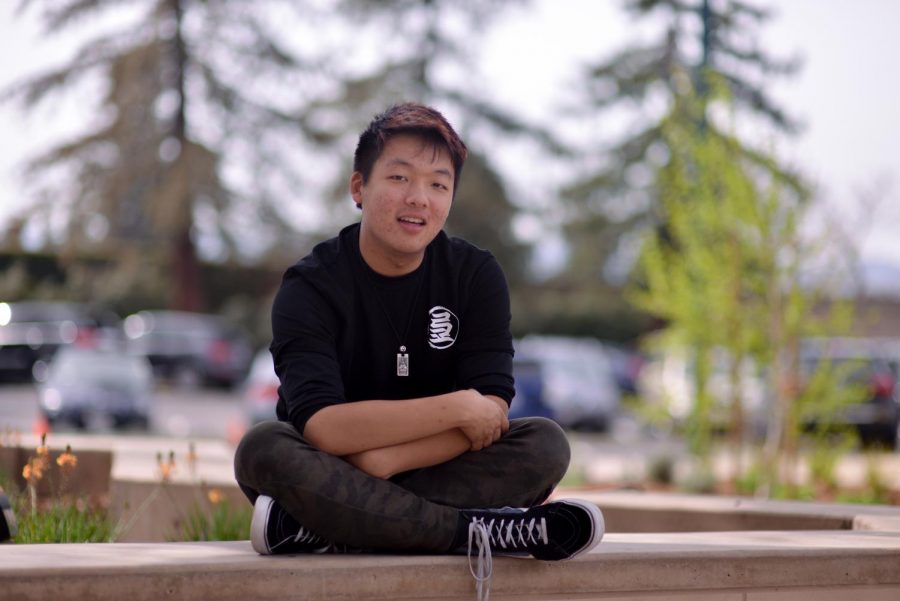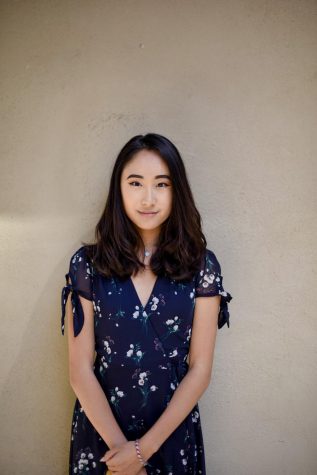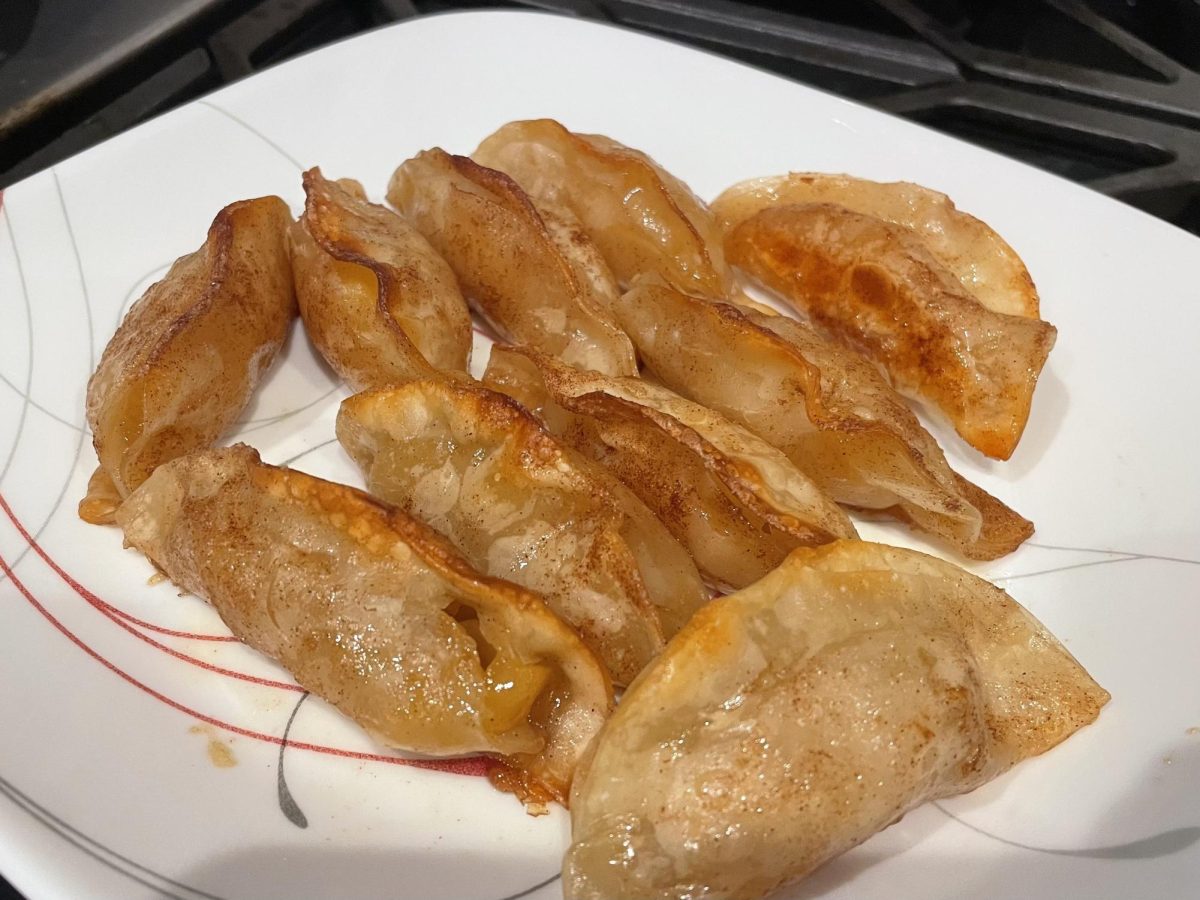Humans of Harker: Linus Li takes pride in the process
“Everyone who knows me can attest that I can easily be a stick in the mud, that I’m way too uptight, but that’s something I really want to learn how to work on, because when you relax and when you stop caring about how you try to comport yourself and when you stop taking yourself too seriously and just let go around a bunch of people who are pretty supportive, you start to learn a lot more about what you like and what you want to do in the future and who you want to be around,” Linus Li (12) said. “And I learned it’s a lot less about keeping up a certain image and more about knowing what a kind of a person you are and who you want to be around.”
April 29, 2018
The beats of electronic dance music blare from the speakers in the corner of the dance room as Linus Li (12), with a dozen other dancers, runs an intense hip-hop routine for the hundredth time. Towards the end of the number, he extends his hand to his side, revealing a complex chemical structure drawn in black Sharpie on the inside of his arm like a coded message. Serotonin, perhaps, or acetylcholine. One, the “happy chemical,” and the other, a neurotransmitter that facilitates focus to learning and memory. Either would be a sign of Linus’ devotion to the science of chemistry.
Linus first discovered an interest in chemistry when working on a titanium project in seventh grade, but it wasn’t until his sophomore year, during a precipitation lab in his AP Chemistry class, that this interest blossomed into passion.
“Watching lead precipitate in this giant balloon of daffodil yellow in a beaker of clear liquid just really got in me in a weird frenzy, almost,” he said. “As time progressed, I just got more and more interested in chemistry, and it just developed into the love that I have now.”
From there, Linus began to explore the field of nanoscience in his junior year.
“I was always amazed by natural phenomena at a fundamental level, and looking at stuff that’s only hundreds of atoms wide or hundreds of atoms thick really never ceases to blow my mind,” he said.
Linus plans to study chemistry in college and hopes to explore applications of nanoscience to archaeological studies, an ambition that stems from a childhood fascination with Greek mythology.
“I think he’s going to be a great chemist, or a great biologist, or a great dentist or doctor,” Linus’ chemistry teacher last semester Dr. David Casso said. “It’s his ability to be incredibly focused and very very serious about his studies, and also take a step back and not take himself too seriously at the same time. Everybody makes mistakes—he’s able to make mistakes and still be excellent and know he’s excellent and sleep at night, even when he makes a mistake or two, which isn’t very often.”
Outside of the chemistry lab, when he’s not preoccupied with lead solutions and carbon chains, Linus devotes much of his time and energy to his work as a hip-hop dancer.
He first started dancing in fifth grade, when his mother signed him up for the annual dance show—“to my absolute horror,” he remembers, laughing—and since then, he has participated in every dance production, a total of eight years’ worth of dance classes at Harker. This January, Linus joined a competitive dance team called Young Skull Club, the youth branch of the acclaimed professional company Academy of Villains.
“You can get out a lot of different emotions in [Linus’ dance style], and it’s not always just happy upbeat stuff like we always have and what I’ve been used to, so it’s been really fun to explore that in his pieces,” Linus’ friend and fellow dancer Chris Gong (11) said. Chris choreographed Linus’ final routine with the Harker dance program, a number in this year’s dance production titled “Resident DJs.”
From the “chubby, temperamental, short, Asian kid,” as Linus describes his fifth grade self, to the powerful dancer he is today, Linus has learned to harness the necessity of collaboration in a successful routine.
“As much as you want to improve yourself, you’re dancing as a team in a routine, not a group of sixteen soloists,” he said. “As I’ve done each dance show and as I’ve done more routines, I began to think more about how other people work and how fast other people learn, and I really started to love to work with other people and learn things from them as well.”
Through his collaborative work with other people, Linus has also learned to appreciate the value of “going with the flow.”
“Everyone who knows me can attest that I can easily be a stick in the mud, that I’m way too uptight,” he said. “That’s something I really want to learn how to work on because when you relax and when you stop caring about how you try to comport yourself and when you stop taking yourself too seriously and just let go around a bunch of people who are pretty supportive, you start to learn a lot more about what you like and what you want to do in the future and who you want to be around.”
With this in mind, Linus strives to maintain a joyful atmosphere with friends, even during more serious conversations.
“Since we go to different schools, I have different stories to tell him, so basically what happens is that we would both order [boba] drinks, and every time there was a serious moment or an important moment he would make the vibe really funny by slurping his drink really really loudly, and it would make everyone laugh at the table,” Linus’ friend Rhea Ram, a senior at Mission San Jose High School, said. “It’s just a very nice feeling that you have someone to count on that can make the vibe very funny, very comical, even if it’s very serious.”
More than anything, Linus has come to appreciate the power of persistence, through his work both as a chemist and as a dancer.
“When a bad result happens, you can’t really just stop. When choreography doesn’t work, you have to re-choreograph. When a chemical reaction doesn’t work, you have to find another one that works,” he said. “You really just have to keep working, until you get the result that you want, or until you get a result that’s even better than what you want. But all the while, it’s still a process, and you have to continue that process.”




![LALC Vice President of External Affairs Raeanne Li (11) explains the International Phonetic Alphabet to attendees. "We decided to have more fun topics this year instead of just talking about the same things every year so our older members can also [enjoy],” Raeanne said.](https://harkeraquila.com/wp-content/uploads/2025/10/DSC_4627-1200x795.jpg)


















![“[Building nerf blasters] became this outlet of creativity for me that hasn't been matched by anything else. The process [of] making a build complete to your desire is such a painstakingly difficult process, but I've had to learn from [the skills needed from] soldering to proper painting. There's so many different options for everything, if you think about it, it exists. The best part is [that] if it doesn't exist, you can build it yourself," Ishaan Parate said.](https://harkeraquila.com/wp-content/uploads/2022/08/DSC_8149-900x604.jpg)




![“When I came into high school, I was ready to be a follower. But DECA was a game changer for me. It helped me overcome my fear of public speaking, and it's played such a major role in who I've become today. To be able to successfully lead a chapter of 150 students, an officer team and be one of the upperclassmen I once really admired is something I'm [really] proud of,” Anvitha Tummala ('21) said.](https://harkeraquila.com/wp-content/uploads/2021/07/Screen-Shot-2021-07-25-at-9.50.05-AM-900x594.png)







![“I think getting up in the morning and having a sense of purpose [is exciting]. I think without a certain amount of drive, life is kind of obsolete and mundane, and I think having that every single day is what makes each day unique and kind of makes life exciting,” Neymika Jain (12) said.](https://harkeraquila.com/wp-content/uploads/2017/06/Screen-Shot-2017-06-03-at-4.54.16-PM.png)








![“My slogan is ‘slow feet, don’t eat, and I’m hungry.’ You need to run fast to get where you are–you aren't going to get those championships if you aren't fast,” Angel Cervantes (12) said. “I want to do well in school on my tests and in track and win championships for my team. I live by that, [and] I can do that anywhere: in the classroom or on the field.”](https://harkeraquila.com/wp-content/uploads/2018/06/DSC5146-900x601.jpg)
![“[Volleyball has] taught me how to fall correctly, and another thing it taught is that you don’t have to be the best at something to be good at it. If you just hit the ball in a smart way, then it still scores points and you’re good at it. You could be a background player and still make a much bigger impact on the team than you would think,” Anya Gert (’20) said.](https://harkeraquila.com/wp-content/uploads/2020/06/AnnaGert_JinTuan_HoHPhotoEdited-600x900.jpeg)

![“I'm not nearly there yet, but [my confidence has] definitely been getting better since I was pretty shy and timid coming into Harker my freshman year. I know that there's a lot of people that are really confident in what they do, and I really admire them. Everyone's so driven and that has really pushed me to kind of try to find my own place in high school and be more confident,” Alyssa Huang (’20) said.](https://harkeraquila.com/wp-content/uploads/2020/06/AlyssaHuang_EmilyChen_HoHPhoto-900x749.jpeg)










